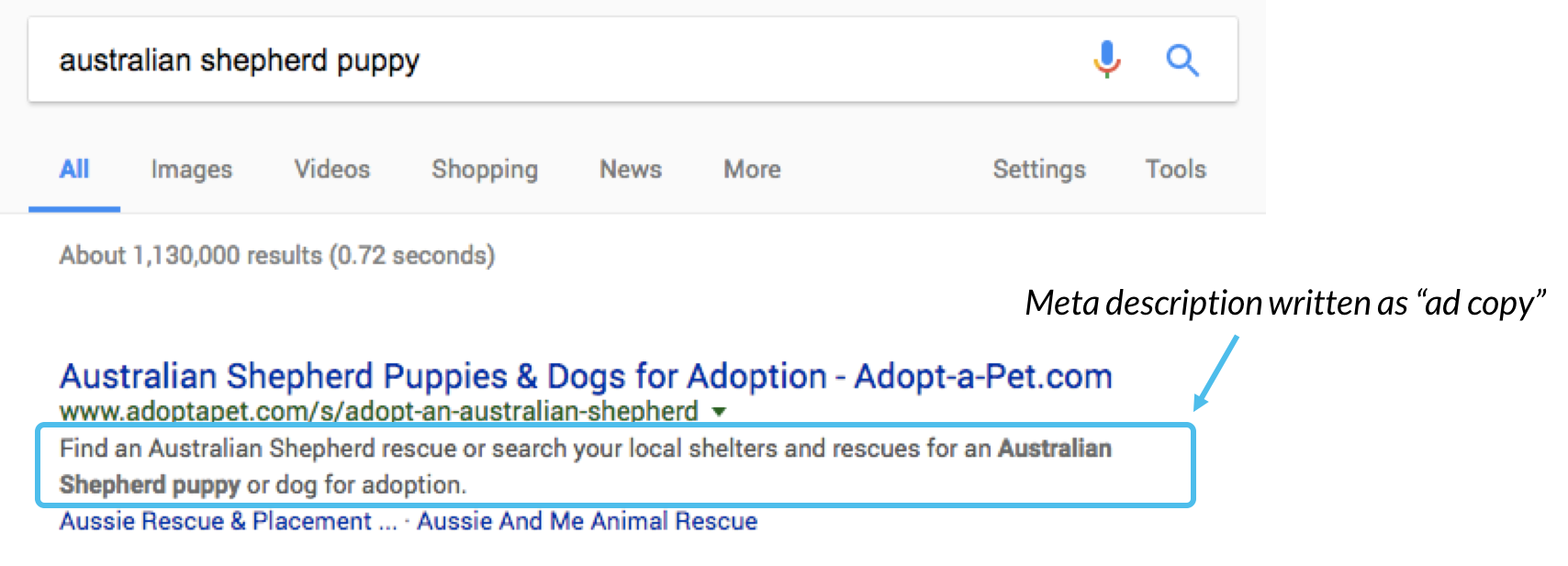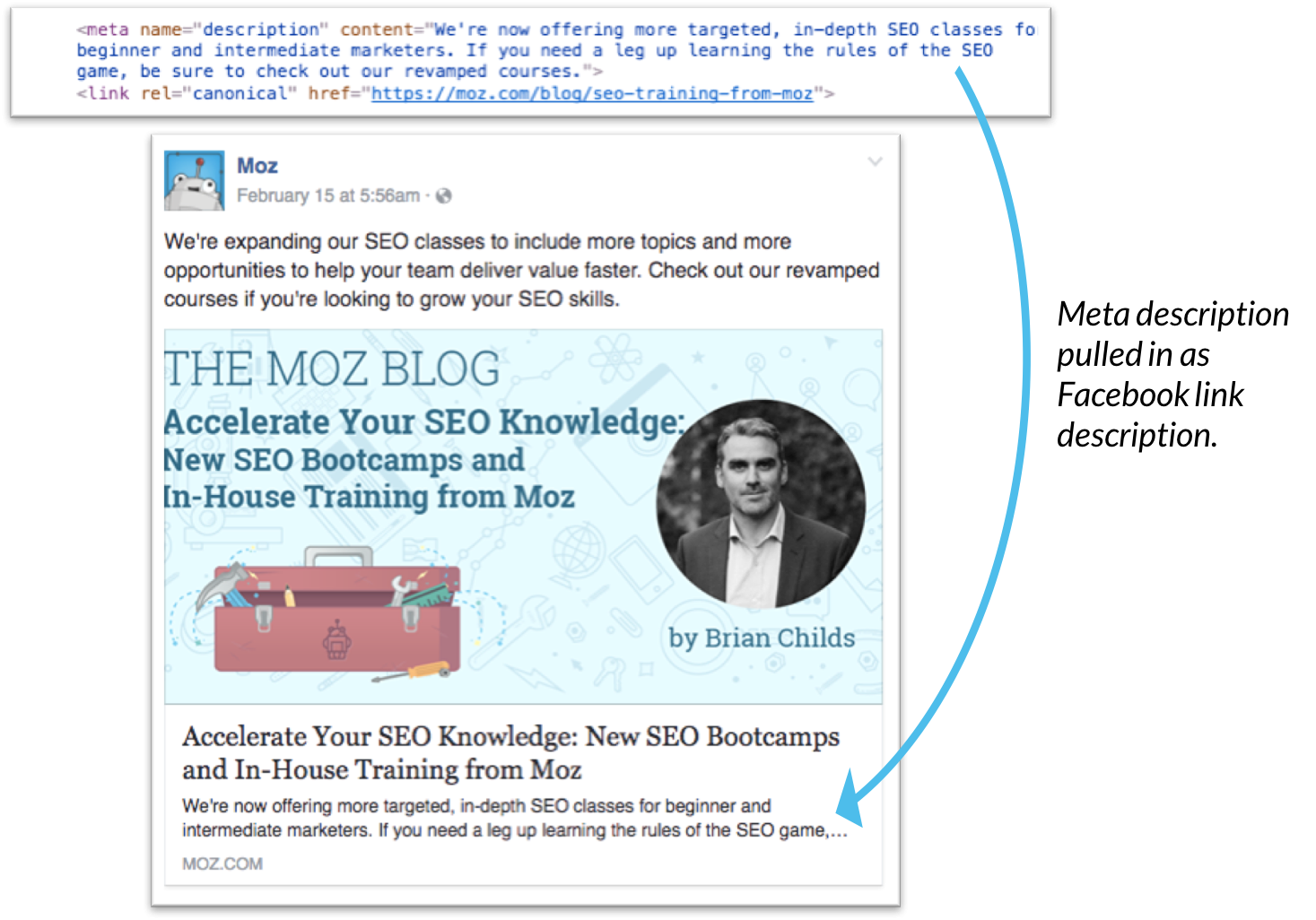Meta Tags - How Google Meta Tags Impact SEO
What Are Meta Tags?
Meta tags are snippets of text that describe a page’s content; the meta tags don’t appear on the page itself, but only in the page’s code. We all know tags from blog culture, and meta tags are more or less the same thing, little content descriptors that help tell search engines what a web page is about.
The only difference between tags you can see (on a blogpost, say) and tags you can’t see is location: meta tags only exist in HTML, usually at the “head” of the page, and so are only visible to search engines (and people who know where to look). The “meta” stands for “metadata,” which is the kind of data these tags provide – data about the data on your page.
Meta Description
What is a meta description?
Meta descriptions are HTML attributes that provide concise summaries of webpages. They commonly appear underneath the blue clickable links in a search engine results page (SERP).
Example:

Meta descriptions are HTML attributes that provide concise summaries of webpages. They commonly appear underneath the blue clickable links in a search engine results page (SERP).
Example:

Code Sample
<head>
<meta name="description" content="This is an example of a meta description. This will often show up in search results.">
</head>
<head> <meta name="description" content="This is an example of a meta description. This will often show up in search results."> </head>
Optimal length
Meta descriptions can be any length, but search engines generally truncate snippets longer than 160 characters. It is best to keep meta descriptions long enough that they're sufficiently descriptive, but shorter than that 160-character limit.
Meta descriptions can be any length, but search engines generally truncate snippets longer than 160 characters. It is best to keep meta descriptions long enough that they're sufficiently descriptive, but shorter than that 160-character limit.
Optimal format
Meta description tags, while not tied to search engine rankings, are extremely important in gaining user click-through from SERPs. These short paragraphs are a webmaster's opportunity to "advertise" content to searchers, and searchers' chance to decide whether the content is relevant and contains the information they're seeking from their search query.
A page's meta description should intelligently (read: in a natural, non-spammy way) employ the keywords that page is targeting, but also create a compelling description that a searcher will want to click. It should be directly relevant to the page it describes, and unique from the descriptions for other pages.
Meta description tags, while not tied to search engine rankings, are extremely important in gaining user click-through from SERPs. These short paragraphs are a webmaster's opportunity to "advertise" content to searchers, and searchers' chance to decide whether the content is relevant and contains the information they're seeking from their search query.
A page's meta description should intelligently (read: in a natural, non-spammy way) employ the keywords that page is targeting, but also create a compelling description that a searcher will want to click. It should be directly relevant to the page it describes, and unique from the descriptions for other pages.
Not a Google ranking factor
Google announced in September of 2009 that neither meta descriptions nor meta keywords factor into Google's ranking algorithms for web search. Google uses meta descriptions to return results when searchers use advanced search operators to match meta tag content, as well as to pull preview snippets on search result pages, but it's important to note that meta descriptions do not directly influence Google's ranking algorithms for normal web search.
That said, an effectively written meta description can entice people to click through to your site, and those clicks most certainly do influence rankings. For that reason among others, it's important to put some effort into these descriptions.
Google announced in September of 2009 that neither meta descriptions nor meta keywords factor into Google's ranking algorithms for web search. Google uses meta descriptions to return results when searchers use advanced search operators to match meta tag content, as well as to pull preview snippets on search result pages, but it's important to note that meta descriptions do not directly influence Google's ranking algorithms for normal web search.
That said, an effectively written meta description can entice people to click through to your site, and those clicks most certainly do influence rankings. For that reason among others, it's important to put some effort into these descriptions.
SEO best practices
Write compelling ad copy
The meta description tag serves the function of advertising copy. It draws readers to a website from the SERP, and thus is a very visible and important part of search marketing. Crafting a readable, compelling description using important keywords can improve the click-through rate for a given webpage. To maximize click-through rates on search engine result pages, it's important to note that Google and other search engines bold keywords in the description when they match search queries. This bold text can draw the eyes of searchers, so you'd like to match your descriptions to search terms as well as possible.

The meta description tag serves the function of advertising copy. It draws readers to a website from the SERP, and thus is a very visible and important part of search marketing. Crafting a readable, compelling description using important keywords can improve the click-through rate for a given webpage. To maximize click-through rates on search engine result pages, it's important to note that Google and other search engines bold keywords in the description when they match search queries. This bold text can draw the eyes of searchers, so you'd like to match your descriptions to search terms as well as possible.

Avoid duplicate meta description tags
As with title tags, it is important that meta descriptions on each page be unique. Otherwise, you'll end up with SERP results that look like this:
 One way to combat duplicate meta descriptions is to create a dynamic and programmatic way to make unique meta descriptions for automated pages. If possible, though, there's no substitute for an original description that you write for each page.
One way to combat duplicate meta descriptions is to create a dynamic and programmatic way to make unique meta descriptions for automated pages. If possible, though, there's no substitute for an original description that you write for each page.
As with title tags, it is important that meta descriptions on each page be unique. Otherwise, you'll end up with SERP results that look like this:

One way to combat duplicate meta descriptions is to create a dynamic and programmatic way to make unique meta descriptions for automated pages. If possible, though, there's no substitute for an original description that you write for each page.
Don't include double quotation marks
Any time quotation marks are used in the HTML of a meta description, Google cuts off that description at the quotation mark when it appears on a SERP. To prevent this from happening, your best to remove all non-alphanumeric characters from meta descriptions. If quotation marks are important in your meta description, you can use the " HTML entity rather than double quotes to prevent truncation.
Any time quotation marks are used in the HTML of a meta description, Google cuts off that description at the quotation mark when it appears on a SERP. To prevent this from happening, your best to remove all non-alphanumeric characters from meta descriptions. If quotation marks are important in your meta description, you can use the " HTML entity rather than double quotes to prevent truncation.
Sometimes it is okay not to write meta descriptions
Although conventional logic would hold that it's universally wiser to write a good meta description rather than let the engines scrape a given web page, this isn't always the case. Use this general rule of thumb to identify whether you should write your own meta description:
If a page is targeting between one and three heavily searched terms or phrases, write your own meta description that targets those users performing search queries including those terms.
If the page is targeting long-tail traffic (three or more keywords) it can sometimes be wiser to let the engines populate a meta description themselves. The reason is simple: When search engines pull together a meta description, they always display the keywords and surrounding phrases that the user has searched for. If a webmaster writes a meta description into the page's code, what they choose to write can actually detract from the relevance the engines make naturally, depending on the query.
One caveat to intentionally omitting meta description tags:Keep in mind that social sharing sites like Facebook commonly use a page's meta description tag as the description that appears when the page is shared on their sites. Without the meta description tag, social sharing sites may just use the first text they can find. Depending on the first text on your page, this might not create a good user experience for users encountering your content via social sharing.

Although conventional logic would hold that it's universally wiser to write a good meta description rather than let the engines scrape a given web page, this isn't always the case. Use this general rule of thumb to identify whether you should write your own meta description:
If a page is targeting between one and three heavily searched terms or phrases, write your own meta description that targets those users performing search queries including those terms.
If the page is targeting long-tail traffic (three or more keywords) it can sometimes be wiser to let the engines populate a meta description themselves. The reason is simple: When search engines pull together a meta description, they always display the keywords and surrounding phrases that the user has searched for. If a webmaster writes a meta description into the page's code, what they choose to write can actually detract from the relevance the engines make naturally, depending on the query.
One caveat to intentionally omitting meta description tags:Keep in mind that social sharing sites like Facebook commonly use a page's meta description tag as the description that appears when the page is shared on their sites. Without the meta description tag, social sharing sites may just use the first text they can find. Depending on the first text on your page, this might not create a good user experience for users encountering your content via social sharing.
